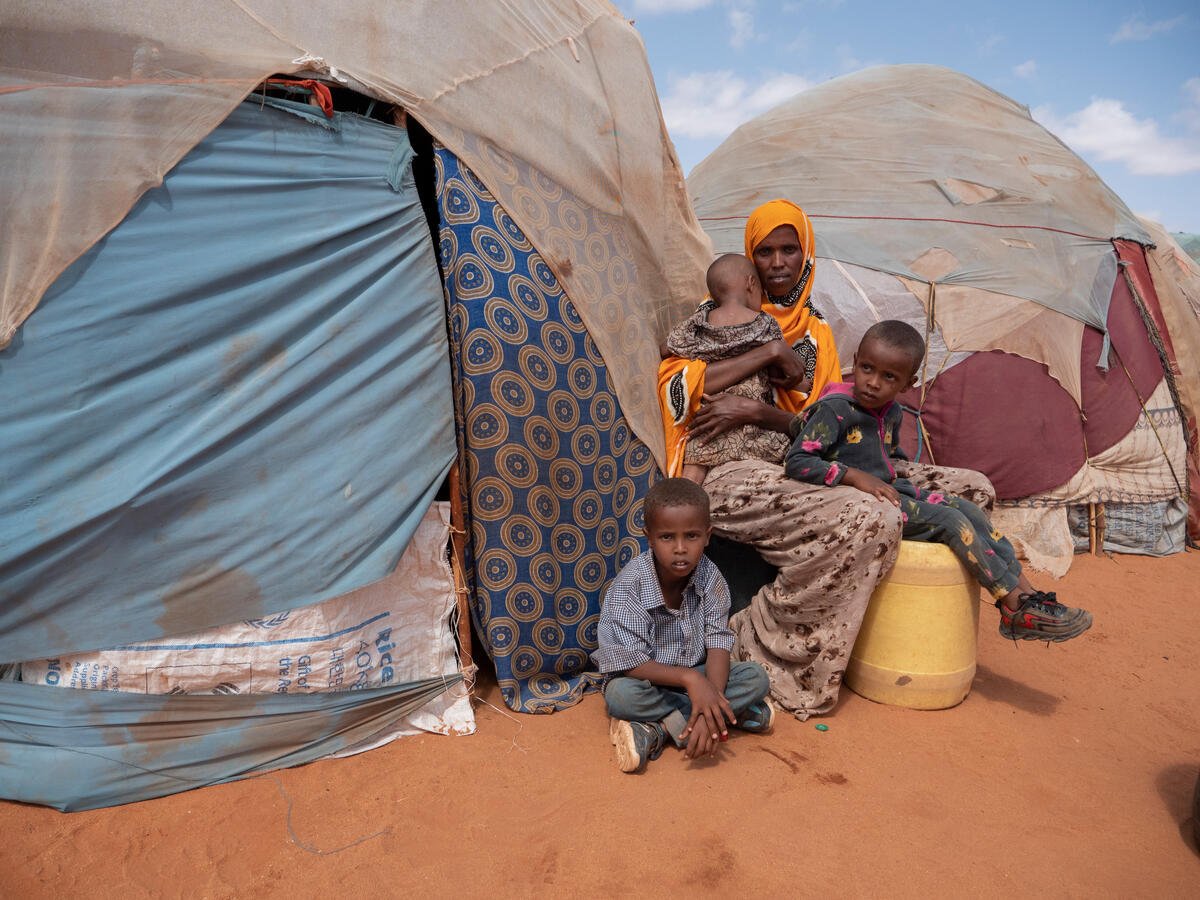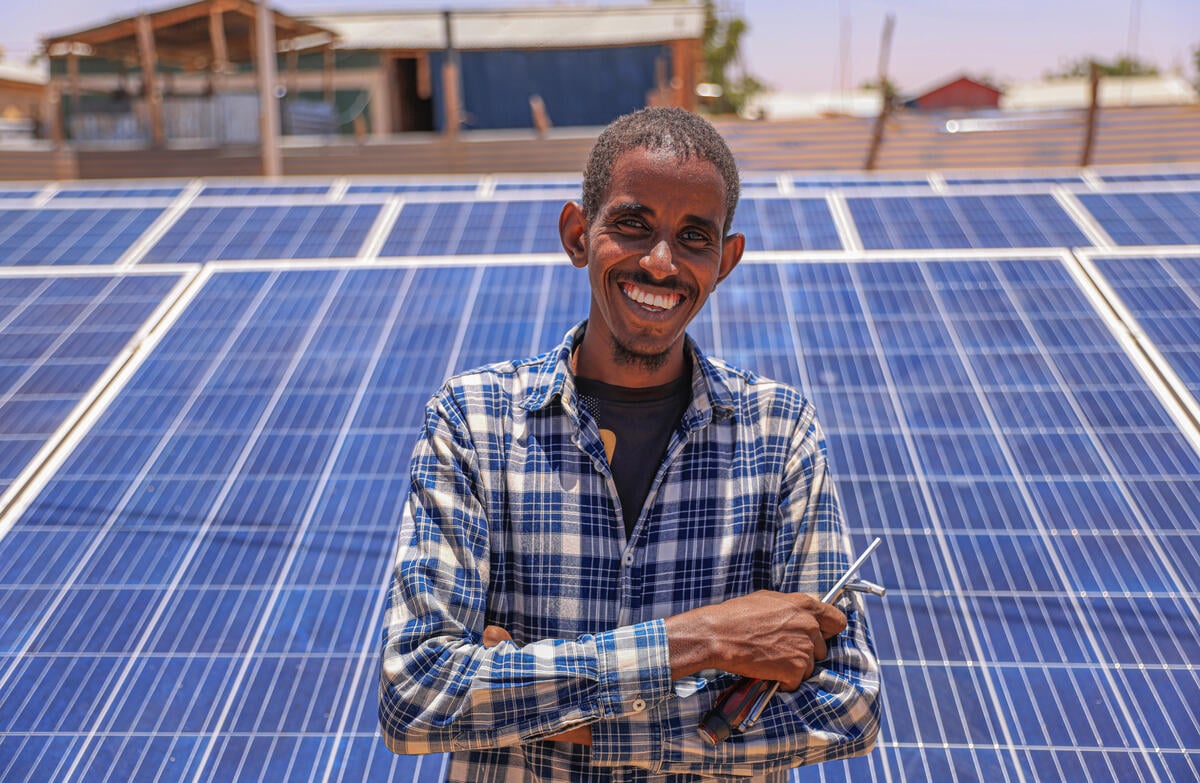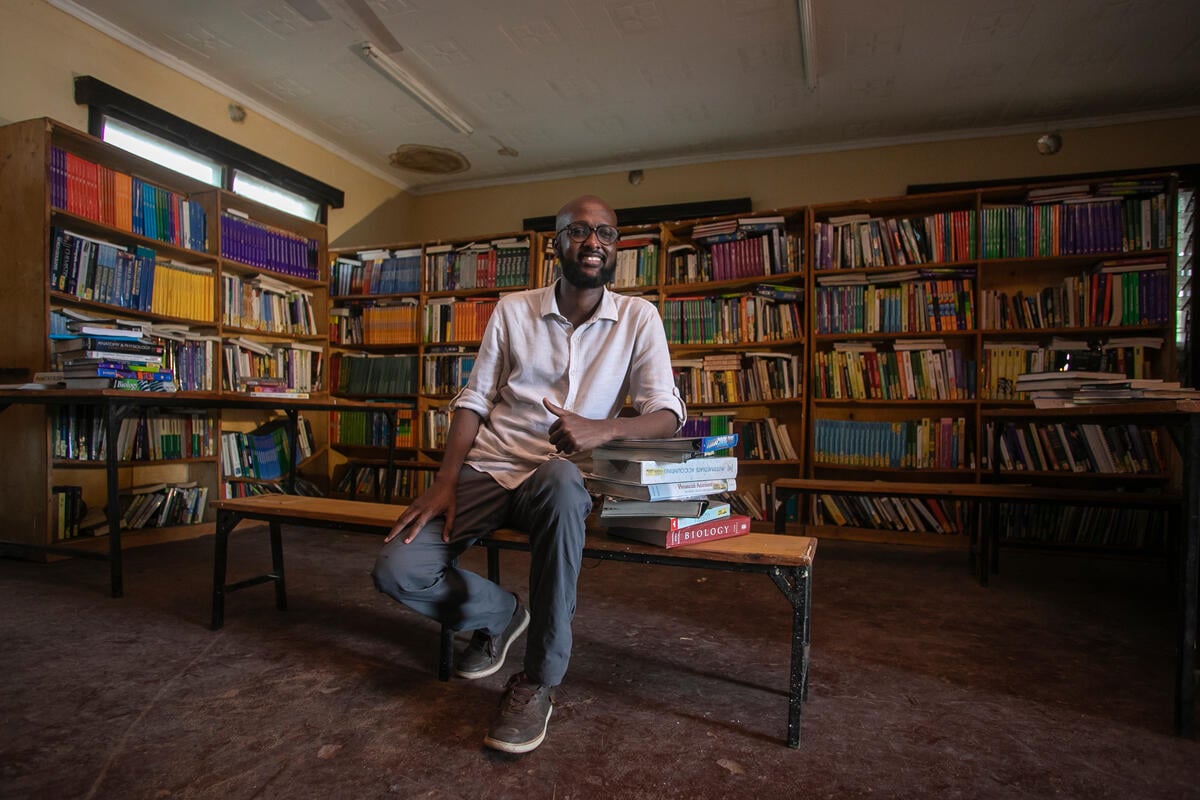UNHCR interventions gaining ground in South Africa's Eastern Cape communities
UNHCR interventions gaining ground in South Africa's Eastern Cape communities

Port Elizabeth, South Africa - Thirty six year old Somali refugee, Adan Ibrahim Ali, smiles warmly as Noxolo Mfanyana walks into the warehouse he manages. She is one of several field advocates, with UNHCR’s partner organisation, the Eastern Cape Refugee Centre (ECRC), responsible for promoting social cohesion between refugees and their South African hosts in over 10 communities across the Eastern Cape Province.
She is on her weekly visit to Korsten, a suburb populated by Somali and Ethiopian refugees. Korsten is one of the locations where refugees have settled and established flourishing businesses, servicing residents across a vast radius in Port Elizabeth.
Since his arrival in South Africa in late 2009, Ali’s hard work and business acumen have helped put the warehouse on sound footing, generating a steady profit and a healthy return on his investment in the enterprise.
Unfortunately, it had also made him the easy target of criminals, hiding in the shadows, impatiently waiting to part him from his earnings.
“It has always been an open secret that Somali and Ethiopian refugees in particular, are the criminals’ ATM,” he chuckles wryly.
Ali attributes this level of harassment to their inability to open bank accounts which over the years, has made them vulnerable to victimization and crime. As a result, many refugees have suffered life-altering injury, loss of livelihoods or even loss of life.
Similarly, South Africa’s banking institutions, hit by wave after wave of fraudulent activities viewed refugees and other foreign nationals with suspicion and mistrust, despite government issued permits and identity documents regularizing their status in the country.
For years, refugees remained in a precarious position, fearful and frustrated.
“We had no choice but to continue keeping money hidden on our persons, in our rooms or in our shops which only perpetuated the cycle of violence against us,” says Ali.
The vulnerability of refugee traders in communities that fed off rumours, stereo-typing and deliberate misinformation, fomented tensions, periodically leading to violence, vandalism and the looting of their businesses.

“For UNHCR,” says Madalena Hogg, Senior Protection Officer the continued exposure of refugees to this kind of crime, has been one of our most critical concerns. The situation had to be dealt with urgently.”
UNHCR established a partnership with ECRC to obtain a better understanding of the socio-economic conditions faced by the communities in which refugees establish their businesses and also to identify the key social challenges they face so that critical interventions of benefit to both refugee and host communities are implemented with the ultimate goal of promoting peaceful co-existence.
After successive meetings with key stakeholders including the South African Police Services (SAPS), relevant government ministries such as the Department of Home Affairs (DHA), civil society organisations and refugees in the identified locations, engaging the province’s banking institutions with extending their services to refugees was critical.
Several meetings later, Standard Bank a financial institution that has operated in South Africa since 1862, responded positively to the ECRC’s overtures.
Interestingly, when ECRC contacted the bank for assistance, it too had been going through an exercise to improve its services and relationship with the public to be more relevant and user-friendly.
“We realized that to continue being the bank of choice for post 1994 South Africa, we had to become more responsive to and cognizant of the demographics of the banking market landscape,” says Lesley Dilley, Team Leader: Pro-Active Sales at Standard Bank.
“Standard Bank became an absolute god send,” says Sweetness Pullen, Director of ECRC, “because we had found a financial institution to help us help refugees.”
With the assisted guidance of relevant refugee stakeholders including the Department of Home Affairs, the SAPS, ECRC and refugees, Standard Bank began opening personal and business banking accounts for refugees, in June 2018.
“While they have to have valid permits issued and verified with the DHA for both personal and business accounts,” explains Dilley, “their businesses also have to be FICA* compliant.”
With the growing trend by criminals to waylay and drive off with refugee vehicles laden with goods and items to stock their businesses, Standard Bank also offers business insurance against the theft or loss of goods in transit as well as resulting from vandalism and looting.
“After an assessment by a consultant of the total expenses of a refugees’ shop items and stock, Standard Bank, advises the client on the amount of insurance, which is paid for on a monthly basis by the business owner.
“All a client has to do if their store is robbed, is to report it to the SAPS after which, they come to the bank with a case number. This triggers our internal systems which ensure that the client receives assistance, based on a number of variables that are a part of the service relating to business banking and insurance.”
“Increasingly,” says Pullen, “more and more refugee business owners including women, are approaching Standard Bank for their services.”
ECRC’s intervention to achieve socially cohesive communities hasn’t stopped here. They are also responding to community concerns relating to accusations against refugees in respect of the sale of expired products and food items.
Through its stakeholder, the Municipal Offices of Public Health, the ECRC has assisted refugee store owners to identify goods and food items not suitable for human consumption. The ECRC has also ensured that several refugee businesses are registered with the South African Revenue Services (SARS) in order to be tax compliant. Many of them now display framed SARS certificates in their shops.
Recently, the ECRC with the support of UNHCR, launched a studio discussion programme on community radio called, Who is my Neighbour?. Its aim is to engage communities on the rights and obligations of refugees.
Refugees in the communities are also part of an interactive WhatsApp Messenger group that shares important, life-saving information between the police, DHA, ECRC and relevant civil society organisations in a timely manner.
Refugees also provide support to Patrol and Peace Builders, who with the support of the SAPS and Community Policing Forums, ensure that they too are protected.
Refugees have also increased their participation in community social events, attending funerals, providing much needed sponsorship for sports activities and supporting soup kitchens for the vulnerable and the indigent.
“This is all been done on the principal that gives the word ‘community’ its meaning,” says Pullen. “It is about constant interaction, based on respect, trust, support and mutual dependence on each other.”
“Many problems at community level have home grown solutions and what is happening in Port Elizabeth is testament to this,” says Pullen. “Even the SAPS has called these initiatives, ‘crime reducing measures.’”
Ali, couldn’t be happier.
“From constant fear and frustration, I can honestly say that my life and that of many refugees is getting better. I feel like a member of the community with the ability to truly exercise my rights and obligations in an environment that treats me as an equal.”
“I really enjoy my life now.”
*The Financial Intelligence Centre Act, 38 of 2001 (FICA), was introduced to fight financial crime, such as money laundering, tax evasion, and terrorist financing activities.









